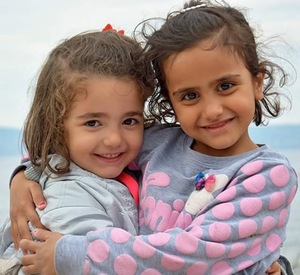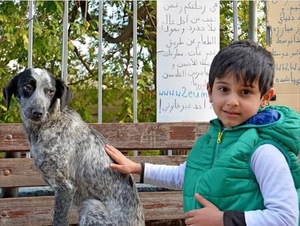 We all have the ability to make an impact on world issues, from wizened grandmothers, to the Hollywood elite, to your average citizen with no money but a big heart. These are lessons we can learn from Lesvos, the economically struggling Greek island whose citizens have selflessly helped Syrian refugees arriving in their waters. The grassroots organization Avaaz recently organized an international campaign and collected 638,000 signatures supporting Lesvos' nomination for a Nobel Peace Prize - more specifically an 83 year old grandmother who bottle fed refugee babies, a fisherman who has saved many from drowning, and American actress Susan Sarandon, who visited Lesvos and reported back for The Huffington Post. The driving force behind these efforts is empathy and realizing that "they" are just like us.
We all have the ability to make an impact on world issues, from wizened grandmothers, to the Hollywood elite, to your average citizen with no money but a big heart. These are lessons we can learn from Lesvos, the economically struggling Greek island whose citizens have selflessly helped Syrian refugees arriving in their waters. The grassroots organization Avaaz recently organized an international campaign and collected 638,000 signatures supporting Lesvos' nomination for a Nobel Peace Prize - more specifically an 83 year old grandmother who bottle fed refugee babies, a fisherman who has saved many from drowning, and American actress Susan Sarandon, who visited Lesvos and reported back for The Huffington Post. The driving force behind these efforts is empathy and realizing that "they" are just like us.
I remember my mother's hand on my shoulder and her words as she spoke softly to me in melodious Greek. "See those people over there?" She used her eyes to direct my gaze toward the people she was focused on. One time it was a lone person picking an orange from a tall pyramid at the produce store. Another time it was a family with young children like my sister and me. Yet another time it was a woman wearing a headscarf. Whoever the person was, she demanded I pay them attention. It was the 1970s and my mother was still wearing her hair teased out in a circular bouffant framing her face, with a light chiffon scarf lightly tied over it to keep the wind from blowing her hard work away.
"See those people over there?" she would say. I would nod my head yes. "They are just like us." I would stare at them and wonder what she meant. Were they immigrants? Did they have an accent like my parents? Were they Greek? These people always had dark hair and eyes like us. But when they spoke, I couldn't understand the language flowing from their lips. "Who are they?" I would ask her, wondering if there was something I was missing as I scrutinized them. She would squeeze my shoulder and say, "They are Armenian," or she would say, "They are Arabs," or "They are Persian," or "They are from the Middle East. They are just like us." She explained to me that they cooked the same food, that their music sounded like ours. They loved their families. They stuck together. The only difference was their religion.
My mother was one of ten children, five girls and five boys, growing up in a small farming village in the Peloponnesian region of Greece, near the western coastline ringing the Ionian Sea. Her family lived in a two-room house they'd made out of mud bricks they'd shaped and dried and stacked themselves. They were dirt poor, relying on their crops, livestock, and well water to survive. She came to the land of plenty at the age of 17 through an arranged marriage, and even now, no matter that nearly 60 years have gone by, she still waxes nostalgic about the idyllic happiness of those days among her sisters and brothers. And while she loves America and has deep gratitude for the comforts she's earned here, Greece will always be her homeland. So as a young mother, deeply missing her siblings and parents, desperately wishing for grandparents, aunts and uncles and cousins for her children, she would point out others that were like us. It was as if she was trying to give us and herself a place of belonging, a sense of extended family, if not by blood, then through cultural similarity.
 Today I look at pictures of Syrian refugees arriving on the shores of the Greek island of Lesvos I can't help but think of her words: They are just like us. I see pictures of families, mothers, fathers, and children in the grips of terror and grief and perhaps temporary relief as they reach shore. Lesvos is separated from Turkey by the narrow Mytilini Strait, at its narrowest point just 3.4 miles wide. This small geographic measurement is the line that separates the Syrian refugees from the shores of Turkey to the next step to freedom through Greece, and yet within these waters mothers and fathers have tried in vain to save their children from drowning. I hear my mother's voice. They are just like us.
Today I look at pictures of Syrian refugees arriving on the shores of the Greek island of Lesvos I can't help but think of her words: They are just like us. I see pictures of families, mothers, fathers, and children in the grips of terror and grief and perhaps temporary relief as they reach shore. Lesvos is separated from Turkey by the narrow Mytilini Strait, at its narrowest point just 3.4 miles wide. This small geographic measurement is the line that separates the Syrian refugees from the shores of Turkey to the next step to freedom through Greece, and yet within these waters mothers and fathers have tried in vain to save their children from drowning. I hear my mother's voice. They are just like us.
Even as the islanders of Lesvos face their own crisis as Greece flounders to remain afloat in its own economic emergency, they extend their hands out to help. They grab hold of the refugees and pull them out of the water. They embrace them, dry them off, clothe them, feed them, house them. Greek fisherman patrol the dark waters at night looking for refugees in danger, ready to pull them out of the sea engulfed in grief and fear, and deliver them to safety. The people of Lesvos extend themselves to help the refugees, contributing their own resources, sacrificing their safety, and tirelessly working to feed and house the refugees. In doing so, they exhibit the highest level of humanity. Rather than saying, we don't have enough for ourselves, find someone else to help you, they give instead, saying, let me share what I have.
CNN reports that 31 United States governors have said that the Syrian refugees are not welcome in their states. Why is it so hard for them to look at the refugees with humanity, and to find a safe way to help them enter? Just like in the old story about Stone Soup, where three traveling Buddhist monks showed villagers how they could make enough delicious soup to feed everyone if they pooled their resources together, the islanders of Lesvos are working together with the Syrian refugees to find a way. I've read numerous accounts of the islanders citing their own poverty as their motivation to help. When they look at the Syrian refugees, I imagine their compassionate hearts whispering, they are just like us. If the citizens of a small economically devastated island can find the courage and resources to help, so can we. All we need to remember is they are just like us.
ONE WAY TO HELP: When Syrian refugees arrive on Lesvos in unstable, overcrowded boats they are drenched in sea water. Their dirty clothes had been discarded until the Dirty Girls of Lesvos started collecting, washing, sorting, and redistributing the clean clothes to arriving Syrian refugees. Your donation provides warm jackets and clothing to the refugees and keeps their old clothes out of landfill. Even Susan Sarandon got into the act. See her post on helping get clean with the Dirty Girls. For more information see their Facebook page.
The children featured in the photos are Syrian refugees that survived the voyage to Lesvos and received clean dry clothes from Dirty Girls of Lesvos Island.
Photo credit: Alison Terry-Evans